
January 2018
AAVMC Announces 2018 Professional Excellence Award Honorees
 |
“These individuals represent the very best of what thousands of outstanding educators and researchers bring to their work every day in our member institutions,” said AAVMC Chief Executive Officer Dr. Andrew T. Maccabe. “We’re pleased to be able to recognize them for their outstanding achievements and contributions and look forward to honoring them publicly during our 2018 annual conference.”
Dr. Jennifer Hodgson from the Virginia-Maryland College of Veterinary Medicine is the recipient of the 2017 AAVMC Distinguished Teacher Award, presented by Zoetis. The award, which is considered one of the most prestigious teaching awards in international academic veterinary medicine, recognizes excellence in professional veterinary medical education and is presented to an educator whose sustained record of teaching excellence and ability, dedication, character and leadership has contributed significantly to the advancement of the profession.
In her role as associate dean for professional programs, Dr. Hodgson is responsible for all academic and student affairs relating to Virginia-Maryland’s Doctor of Veterinary Medicine (DVM) program. She teaches bacteriology and mycology in the DVM curriculum and is a leader in advancing veterinary medical education nationally and internationally. Her competency-based approach to teaching involves using proven techniques that equip students to learn for themselves by finding, analyzing and interpreting information in the context of real-life clinical cases.
Dr. Colin Parrish, the John M. Olin Professor of Virology at the Cornell University College of Veterinary Medicine, is the recipient of the 2018 AAVMC Excellence in Research Award. Selected by a committee of peers, the honor designates Dr. Parrish as the outstanding veterinary medical researcher of the year. The AAVMC Board of Directors established the annual research award in 2010 to recognize outstanding research and scholarly achievements in the field of veterinary medicine. It recognizes an individual who, over the course of his or her career, has demonstrated excellence in original research, leadership in the scientific community, and mentoring of trainees and colleagues in any discipline of veterinary medicine.
Dr. Parrish is an internationally renowned virologist and a leading expert in the details of virus-host interaction. His studies into the properties that allow viruses to cross species and produce new outbreaks have demonstrated the importance of understanding animal viruses and their role in disease emergence. His work has resulted in several notable discoveries and advances, including elucidating how parvovirus capsids interact with host cells and tissues and how naturally occurring variant viruses gain the ability to infect new host cells.
Dr. James A. Roth, the Clarence Hartley Covault Distinguished Professor in Iowa State University’s (ISU) College of Veterinary Medicine, is the recipient of the 2018 Senator John Melcher, DVM Leadership in Public Policy Award. The award, established in 2007, is presented to current or former faculty, staff, or students at an AAVMC member institution to recognize leadership in public policy that advances veterinary medical education and success in advocating for veterinary medical education on a national or international scale.
Dr. Roth’s career has focused on improving veterinary medical education and public health related to animal health, public health and food security. He directs the Institute for International Cooperation in Animal Biologics, working with the veterinary biologics industry, government regulatory and research agencies, universities, veterinarians, and producers to improve the availability and use of biologics for animals worldwide. He also developed a nationally and internationally recognized Veterinary Biologics Training Program that trains employees and government officials on the United States Department of Agriculture’s regulatory process. Under Dr. Roth’s leadership, the Center for Food Security and Public Health was established at ISU with funding from the Centers for Disease Control and Prevention. The center works to increase national preparedness for accidental or intentional introduction of disease agents that threaten food production and/or public health.
Dr. Norman B. Williamson from Massey University in New Zealand is the recipient of the AAVMC’s Billy E. Hooper Award for Distinguished Service, presented by the AAVMC to an individual whose leadership and vision has made a significant contribution to academic veterinary medicine and the veterinary profession.
Dr. Williamson was a pioneer in the development and implementation of computationally-based herd health programs in dairy cattle and has made major contributions throughout his career in academic administration. He served for eleven years as Program Director in Veterinary Sciences of the College of Science at Massey University (senior leadership position). He has also served as chair of the Veterinary Schools’ Accreditation Advisory Committee of the Australasian Veterinary Boards’ Council since 2012, where he has made important contributions in the quality of accreditation programs, in both Australia and New Zealand, as well as in developing nations such as Bangladesh. He is also heralded as a mentor for many colleagues whose own careers have exerted a major influence on the quality of academic veterinary medicine around the world.
Outcomes Assessment: Getting Everyone on the Same Page
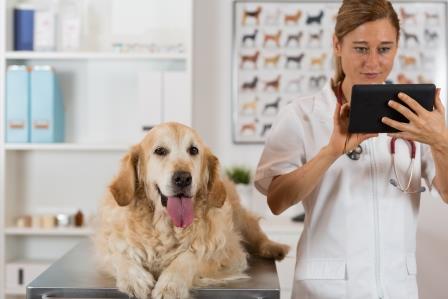 |
An important requirement for all veterinary colleges and schools is that they assess the readiness of their students to provide entry-level healthcare independently at the time of graduation. But a general lack of consistency in how institutions do this has caused some uncertainty and a lot of variability with the process.
For the past two years, a group of respected educators from AAVMC member institutions has been working to address this challenge. Led by Associate Deans for Academic Affairs Dr. Jennie Hodgson of the Virginia-Maryland College of Veterinary Medicine and Dr. Laura Molgaard of the University of Minnesota College of Veterinary Medicine, the team has been developing a “competency” framework for veterinary medicine that is aligned with approaches used by other health professions.
“This is a very important project for the AAVMC, and we’re excited about the extraordinary work that’s being accomplished by this working group,” said AAVMC CEO Dr. Andrew T. Maccabe. “Society requires a great deal from our profession, and this will improve our ability to more capably and consistently assess learning outcomes and readiness for practice.”
The framework will be introduced during a plenary session at the 2018 AAVMC annual meeting in March 2018. Printed communications and a website detailing the framework will also be unveiled at the same time.
The task has been substantial, and work is still underway. “What does the public expect a graduate veterinarian to be able to do?” said Hodgson rhetorically during a recent conversation on the project. “How do you actually assess students’ competencies in these areas?”
Working with AAVMC Senior Director for Academic Affairs and Research, Dr. Ted Mashima, the group retained Dr. Jody Frost, a noted consultant and facilitator who has extensive experience working with educators in the health professions on similar projects.
The group has met numerous times, in person and virtually. They began the work by systematically analyzing competency-based frameworks used in health professions such as medicine, dentistry, and nursing as well as existing frameworks in veterinary medical education. Informed by that analysis, the CBVE began the substantial task of constructing a new framework for veterinary medicine.
To this end, the working group identified nine “Domains of Competence” that consist of individual competencies and example or illustrative subcompetencies. They have also created a set of “Entrustable professional activities (EPAs)” that are essential skills requiring demonstration of competence in a range of domains through authentic/real-world practice in the workplace. A schema demonstrating the linkages between competencies and EPAs has also been developed.
The group has collaborated extensively with experts throughout the process, and frequently consulted stakeholders to gather input and feedback to help make revisions.
The framework will be introduced as a “best practices” model which all member institutions are welcome to adopt or consult as they modify existing curricula or develop new ones. While no action will be taken to adopt the program as an official standard for evaluating educational outcomes, the body of work represents the most substantial effort ever undertaken in this area of academic veterinary medicine and is expected to serve as a valuable tool to guide curricular development, refinement and outcomes assessment.
Members of the working group include: Dr. Harold Bok, Utrecht University; Dr. Kristin Chaney, Texas A&M University; Dr. Jan Ilkiw, University of California – Davis; Dr. Susan Matthew, Washington State University; Dr. Stephen May, Royal Veterinary College; Dr. Emma Read, University of Calgary; Dr. Bonnie Rush, Kansas State University; and Dr. Kathy Salisbury, Purdue University.
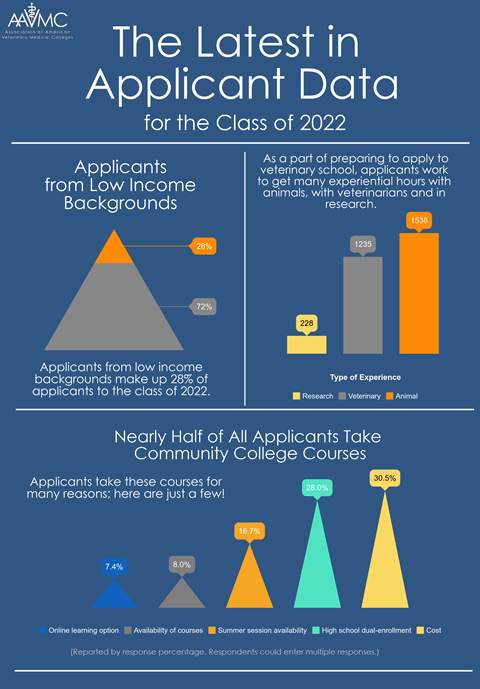 |
Combined VEC and PCVE Joint Symposium to be Presented at Cornell in June
 |
“The symposium will foster an environment in which participants can showcase their work and exchange ideas,” said Katherine M. Edmondson, PhD, assistant dean for students and instruction at Cornell University’s College of Veterinary Medicine. “We are excited by the opportunity to host our colleagues and engage in a stimulating discussion of issues that are fundamental to our roles as educators.”
The VEC provides online and face-to-face collaboration and sharing between veterinary medical educators. PCVE’s mission is to enhance primary care programs at colleges of veterinary medicine, develop exceptional primary care educators, prepare career-ready veterinarians, and create opportunities for collaboration between primary care veterinary educators and the profession. Both are component organizations of the AAVMC that operate under the auspices of the Academic Affairs Committee.
For this combined symposium – the first of its kind to bring the two groups together – organizers have worked to create a program centered on how to help students develop the knowledge, skills and attitudes that will allow a smooth transition from their role as pre-clinical and clinical students to that of practitioner.
Conference organizers are seeking presentations on curriculum, faculty development, assessing student learning, the development of professional skills, and learning in the digital age. They are especially interested in proposals that are grounded in relevant educational scholarship, empirical research, and address multiple perspectives. Proposals are due January 15.
Presentation categories include descriptive sessions, panel discussions, problem solving sessions, a common interest roundtable and workshops.
Some topic suggestions include assessing clinical skills, curriculum mapping, integrating basic and clinical science disciplines, personalized learning, partnerships with private practices, and more.
For information on submitting proposals, please click here.
To attend the symposium, register here.
AVMA-AAVMC Joint Committee Meets in December
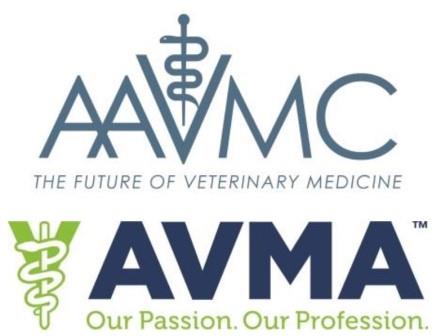 |
During the day-long meeting, leaders from the two organizations discussed a variety of programs and issues affecting the profession and academic veterinary medicine.
Following updates from AAVMC President Dr. Phillip Nelson and AVMA President Dr. Michael Topper on their respective organizations, the group worked through a seven-point agenda that explored major issues of mutual interest.
AAVMC Chief Executive Officer Dr. Andrew T. Maccabe and AVMA Executive Vice-President Dr. Janet Donlin made a joint presentation concerning the Council on Accreditation, and Nelson updated the group on the status of the AAVMC Working Group for Internships.
Topper led discussions on mental health and wellness issues and the “Fix-the-Debt” Initiative. Former AAVMC President Dr. Douglas Freeman and former AVMA President Dr. Thomas Meyer led discussions on the Veterinary Futures Commission, and Maccabe presented an update on Competency Based Veterinary Education. Topper concluded the meeting with a presentation on the Partnership for Healthy Pets.
The Joint Committee consists of the senior leadership of each organization and is designed to foster collaboration, mutual understanding and progress. Records show the group has been meeting regularly since the earliest days of the AAVMC. The Committee’s next meeting will be held in June 2018 in Schaumburg.
CIVME Meets in Mexico City
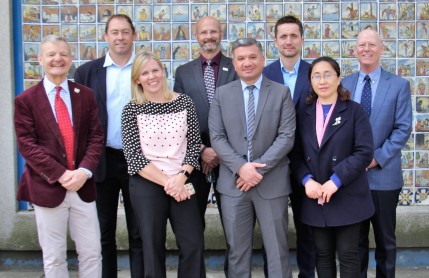 |
| (Left to right: Dr. Stephen May (UK/Ireland); Dr. Paul Mills (Australia/New Zealand); Dr. Emma Read (Canada/US); Tony Wynne (AAVMC); Dr. Ehab Abu-Basha (Middle East/North Africa); Dr. Harold Bok (Continental Europe); Dr. Fei Rong Mei (China/Southeast Asia /India); Dr. Andrew T. Maccabe (AAVMC). Not pictured: Dr. John David Kabasa (Africa); Dr. Francisco Trigo (Latin America/Caribbean). |
Several regional representatives, as well as AAVMC CEO Dr. Andrew T. Maccabe and CIVME program director Tony Wynne, met to discuss the global needs of veterinary medical education.
Formed by the AAVMC in 2015, CIVME’s charge is to advance high quality academic veterinary medicine throughout the world.
The council addresses this goal through:
- Communication and collaboration that advances international veterinary medical education
- Collaboration among educational researchers
- Dissemination of innovations and other educational advances among international members
You can learn more about CIVME on AAVMC’s website.
Fifth Annual One Health Congress in Saskatoon June 22-25, 2018
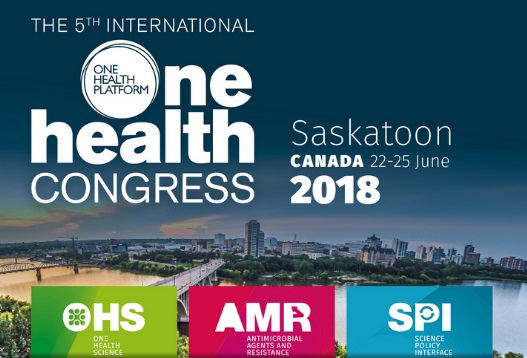 |
A major program track on antimicrobial resistance will be presented, as will a track on the Science Policy Interface (SPI) which seeks to encourage interaction between the scientific and policy-making communities. The meeting will also include a University Lounge where academic institutions will showcase their One Health programs. To examine a comprehensive program document, please click here.
Nominations Sought for 2018 AAVMC Communications Excellence Award
 |
The award includes a $1,000 honorarium, a commemorative and public recognition. It will be formally presented during the annual meeting of the Association of Veterinary Advancement Professionals (AVAP) which will be held in conjunction with the 2018 AVMA Meeting in Denver, Colorado.
More information on the award and a downloadable nomination form are available on the AAVMC Awards site.
Award judging is conducted by a team of judges that consists of communication professionals representing member organizations of the Federation of Associations of Schools of the Health Professions (FASHP) in Washington, D.C.
The AAVMC Board of Directors established the Communications Excellence Award in 2013 to recognize the important role of communications in advancing academic veterinary medicine and the profession, inspire higher level of performance and foster collaboration among member institutions.
Past winners have included colleges and schools of veterinary medicine at the University of Pennsylvania, the University of California – Davis, Texas A&M University and the University of Florida.
AVMA Enhances Legislative Relations Tool
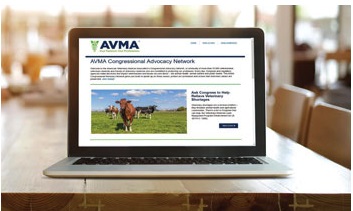 |
The American Veterinary Medical Association (AVMA) recently launched a new and improved, online tool—the Congressional Advocacy Network, with 30,000-plus members—that makes it easier for the nation’s veterinarians, veterinary students and other stakeholders to keep abreast of legislative issues affecting veterinary medicine and respond proactively.
The AVMA and AAVMC work together on many advocacy issues, often co-hosting legislative briefings and working together on the Veterinary Medicine Caucus, co-chaired by Rep. Kurt Schrader, (OR-05) and Rep. Ted Yoho, DVM (FL-03).
This improved tool makes it easy to identify key issues, look up legislators’ contact information and quickly personalize and send letters to members of Congress.
A sign-up link is available on the site.
Academic Veterinary Medicine in the News
Veterinary Mental Health Practitioners Forms as Part of AAVMC
Veterinary Practice News
Innovation Toronto
HBO
Innovations Report
How the Growing Division Between the Wealthy and the Poor is Impacting Veterinary Students and Recent Graduates
How the Growing Division Between the Wealthy and the Poor is Impacting Veterinary Students and Recent Graduates
Pittsburgh Post Gazette
Purdue:State Budget Committee Approves $37M for Veterinary School
Purdue:State Budget Committee Approves $37M for Veterinary School
Veterinary Practice News
Commonalities in Late Stages of Inherited Blinding Diseases Suggest Targets for Therapy
Commonalities in Late Stages of Inherited Blinding Diseases Suggest Targets for Therapy
Sun Journal
AAVMC Announces 2018 Award Honorees
AAVMC Announces 2018 Award Honorees
Veterinary Practice News
Veterinary Surgeons Perform First-known Brain Surgery to Treat Hydrocephalus in Fur SealScience Newsline
UPI
LMU-CVM Selected to Host International Veterinary Simulation in Teaching Conference
Lincoln Memorial University College of Veterinary Medicine
Lincoln Memorial University College of Veterinary Medicine
On the Move
Dr. Robert Weiss has been named Associate Dean of Research at the Cornell University College of Veterinary Medicine.
Upcoming Meetings
2018 Deans Conference, Feb. 1-3, 2018
2018 AAVMC Annual Conference & Assembly – March 2-4, 2018
Combined VEC/PCVE Joint Symposium – June 22-24, 2018
2018 AAVMC Annual Conference & Assembly – March 2-4, 2018
Combined VEC/PCVE Joint Symposium – June 22-24, 2018




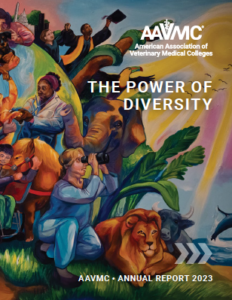
SHARE